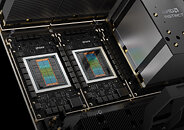- Joined
- Aug 19, 2017
- Messages
- 2,846 (1.03/day)
According to the latest report from Bloomberg, AMD has hit a roadblock in offering its top-of-the-line AI accelerator in the Chinese market. The newest AI chip is called Instinct MI309, a lower-performance Instinct MI300 variant tailored to meet the latest US export rules for selling advanced chips to China-based entities. However, the Instinct MI309 still appears too powerful to gain unconditional approval from the US Department of Commerce, leaving AMD in need of an export license. Originally, the US Department of Commerce made a rule: Total Processing Performance (TPP) score should not exceed 4800, effectively capping AI performance at 600 FP8 TFLOPS. This rule ensures that processors with slightly lower performance may still be sold to Chinese customers, provided their performance density (PD) is sufficiently low.
However, AMD's latest creation, Instinct MI309, is everything but slow. Based on the powerful Instinct MI300, AMD has not managed to bring it down to acceptable levels to acquire a US export license from the Department of Commerce. It is still unknown which Chinese customer was trying to acquire AMD's Instinct MI309; however, it could be one of the Chinese AI labs trying to get ahold of more training hardware for their domestic models. NVIDIA has employed a similar tactic, selling A800 and H800 chips to China, until the US also ended the export of these chips to China. AI labs located in China can only use domestic hardware, including accelerators from Alibaba, Huawei, and Baidu. Cloud services hosting GPUs in US can still be accessed by Chinese companies, but that is currently under US regulators watchlist.

View at TechPowerUp Main Site | Source
However, AMD's latest creation, Instinct MI309, is everything but slow. Based on the powerful Instinct MI300, AMD has not managed to bring it down to acceptable levels to acquire a US export license from the Department of Commerce. It is still unknown which Chinese customer was trying to acquire AMD's Instinct MI309; however, it could be one of the Chinese AI labs trying to get ahold of more training hardware for their domestic models. NVIDIA has employed a similar tactic, selling A800 and H800 chips to China, until the US also ended the export of these chips to China. AI labs located in China can only use domestic hardware, including accelerators from Alibaba, Huawei, and Baidu. Cloud services hosting GPUs in US can still be accessed by Chinese companies, but that is currently under US regulators watchlist.

View at TechPowerUp Main Site | Source





 To satiate the lack of blood in those cities, criminals were sent into an arena instead. The same criminals that made it not quite as safe for everyone on the streets themselves.
To satiate the lack of blood in those cities, criminals were sent into an arena instead. The same criminals that made it not quite as safe for everyone on the streets themselves.